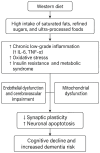Western Diet and Cognitive Decline: A Hungarian Perspective-Implications for the Design of the Semmelweis Study
- PMID: 40806031
- PMCID: PMC12348539
- DOI: 10.3390/nu17152446
Western Diet and Cognitive Decline: A Hungarian Perspective-Implications for the Design of the Semmelweis Study
Abstract
Background: Accelerated demographic aging in Hungary and across Europe presents significant public health and socioeconomic challenges, particularly in preserving cognitive function and preventing neurodegenerative diseases. Modifiable lifestyle factors-especially dietary habits-play a critical role in brain aging and cognitive decline.
Objective: This narrative review explores the mechanisms by which Western dietary patterns contribute to cognitive impairment and neurovascular aging, with specific attention to their relevance in the Hungarian context. It also outlines the rationale and design of the Semmelweis Study and its workplace-based health promotion program targeting lifestyle-related risk factors.
Methods: A review of peer-reviewed literature was conducted focusing on Western diet, cognitive decline, cerebrovascular health, and dietary interventions. Emphasis was placed on mechanistic pathways involving systemic inflammation, oxidative stress, endothelial dysfunction, and decreased neurotrophic support.
Key findings: Western dietary patterns-characterized by high intakes of saturated fats, refined sugars, ultra-processed foods, and linoleic acid-are associated with elevated levels of 4-hydroxynonenal (4-HNE), a lipid peroxidation product linked to neuronal injury and accelerated cognitive aging. In contrast, adherence to Mediterranean dietary patterns-particularly those rich in polyphenols from extra virgin olive oil and moderate red wine consumption-supports neurovascular integrity and promotes brain-derived neurotrophic factor (BDNF) and nerve growth factor (NGF) activity. The concept of "cognitive frailty" is introduced as a modifiable, intermediate state between healthy aging and dementia.
Application: The Semmelweis Study is a prospective cohort study involving employees of Semmelweis University aged ≥25 years, collecting longitudinal data on dietary, psychosocial, and metabolic determinants of aging. The Semmelweis-EUniWell Workplace Health Promotion Model translates these findings into practical interventions targeting diet, physical activity, and cardiovascular risk factors in the workplace setting.
Conclusions: Improving our understanding of the diet-brain health relationship through population-specific longitudinal research is crucial for developing culturally tailored preventive strategies. The Semmelweis Study offers a scalable, evidence-based model for reducing cognitive decline and supporting healthy aging across diverse populations.
Keywords: cerebrovascular aging; cognitive decline; cognitive frailty; mediterranean diet; neuroinflammation; polyphenols; semmelweis study; western dietary pattern; workplace health promotion.
Conflict of interest statement
The authors declare that they have no competing interest.
Figures
Similar articles
-
The role of purpose in life in healthy aging: implications for the Semmelweis Study and the Semmelweis-EUniWell Workplace Health Promotion Model Program.Geroscience. 2025 Jun;47(3):2817-2833. doi: 10.1007/s11357-025-01625-6. Epub 2025 Mar 29. Geroscience. 2025. PMID: 40155585 Free PMC article. Review.
-
The role of burnout prevention in promoting healthy aging: frameworks for the Semmelweis Study and Semmelweis-EUniWell Workplace Health Promotion Program.Geroscience. 2025 Jul 8. doi: 10.1007/s11357-025-01780-w. Online ahead of print. Geroscience. 2025. PMID: 40627122 Review.
-
Prescription of Controlled Substances: Benefits and Risks.2025 Jul 6. In: StatPearls [Internet]. Treasure Island (FL): StatPearls Publishing; 2025 Jan–. 2025 Jul 6. In: StatPearls [Internet]. Treasure Island (FL): StatPearls Publishing; 2025 Jan–. PMID: 30726003 Free Books & Documents.
-
MarkVCID cerebral small vessel consortium: I. Enrollment, clinical, fluid protocols.Alzheimers Dement. 2021 Apr;17(4):704-715. doi: 10.1002/alz.12215. Epub 2021 Jan 21. Alzheimers Dement. 2021. PMID: 33480172 Free PMC article.
-
Dietary Intake, Mediterranean and Nordic Diet Adherence in Alzheimer's Disease and Dementia: A Systematic Review.Nutrients. 2025 Jan 17;17(2):336. doi: 10.3390/nu17020336. Nutrients. 2025. PMID: 39861466 Free PMC article.
References
-
- Eurostat: Aging Europe. [(accessed on 11 April 2025)]. Available online: https://ec.europa.eu/eurostat/cache/digpub/ageing/
-
- Aiyar S., Ebeke C.H., Shao X. International Monetary Fund (IMF) European Department, IMF Working Paper. International Monetary Fund; Washington, DC, USA: 2016. The impact of workforce aging on European productivity. No. 16/238.
-
- Leijten F.R., Hoedemakers M., Struckmann V., Kraus M., Cheraghi-Sohi S., Zemplényi A., Ervik R., Vallvé C., Huiĉ M., Czypionka T. Defining good health and care from the perspective of persons with multimorbidity: Results from a qualitative study of focus groups in eight European countries. BMJ Open. 2018;8:e021072. doi: 10.1136/bmjopen-2017-021072. - DOI - PMC - PubMed
-
- Zaidi A., Gasior K., Zolyomi E., Schmidt A., Rodrigues R., Marin B. Measuring active and healthy ageing in Europe. J. Eur. Soc. Policy. 2017;27:138–157. doi: 10.1177/0958928716676550. - DOI
Publication types
Grants and funding
LinkOut - more resources
Full Text Sources


